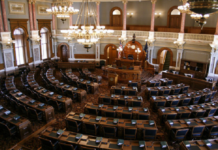Senators are looking to reopen the just-passed emergency management law because of concerns about how it’s being applied across the state.
A proposal surfaced late Thursday addressing provisions of the law that provided recourse for Kansans to go to court if they believe they’ve been hurt by emergency government orders that were too burdensome.
Republican state Sen. Kellie Warren of Overland Park unveiled a proposal that’s intended to clarify those sections to ensure that they can’t be overriden by the courts.
Warren’s proposal comes in response to an administrative order issued in Johnson County that sets out interim procedures for how civil actions can be brought under the emergency management law passed by the Legislature.

Warren believes the order goes around the state’s emergency management law that was intended to give Kansans judicial relief from heavy-handed government orders.
Whether the House – surprised by the Warren’s proposal – will consider the revisions remains to seen.
“I thought we had put it to bed,” said Republican state Sen. Fred Patton, chairman of the Senate Judiciary Committee.
“If there are big concerns we need to address, then I’m open to it,” he said.
“I don’t want to reopen it 14 days after we passed the bill because we’re hearing a couple of concerns,” he said.
The order signed by 10th Distict Chief Judge Thomas Kelly Ryan sets new requirements for anyone who brings a petition under the new emergency management law.
The law now requires governments to show that emergency orders were narrowly tailored to respond to an emergency in the least restrictive way possible.
However, Ryan’s order requires the aggrieved parties to specify how the order in question could have been more narrowly tailored to respond to the disaster emergency addressed by the government order.
Warren said that turns the new law upside down by requiring the aggrieved individuals to show how the government could have fashioned a better order.
The senator said the statute needs to be tweaked as more and more Kansans bring claims under the law passed by the Legislature.
The law, Warren said, was designed to provide an easy path for due process for individuals and businesses who were hurt by government orders issued by the state, counties, cities or school districts.
“We need to provide clarification,” Warren said. “We’ve already seen how governing bodies are circumventing the intent of the Legislature.”
Warren said Ryan’s order is making it “onerous” and “burdensome” and “laborious” to file a petiton challenging government orders.
“It could be a bellwether for courts across the state to put into place other orders and it might even be a template for the Supreme Court to put into place for the whole state,” Warren said.
The law, she said, allowed courts to put in place temporary procedures to make the process of filing grievances with smoothly and efficiently.
She said the courts, however, are already starting to veer away from the law, citing Ryan’s order shifting the burden of proof for claims filed under the law.
Under the law, local school boards are required to conduct a hearing within 72 hours upon receiving a complaint about an emergency order.
The board is required to issue a decision within seven days after the hearing is conducted.
The law allows an aggrieved individual to appeal the school board’s decision within
30 days to district court.
A judge has to hold a hearing within 72 hours of receiving a petition for
such action.
A judge has seven days to rule. If the court doesn’t issue a ruling in seven days, the petitioner would be granted a judgment in their favor.
A similar procedure is allowed for city, county and state governments, but someone can go straight to court and get a hearing within 72 hours and a decision in seven days.
Warren’s proposal tightens up some of those time requirements, spelling out specifically how the 72 hours and the seven days are to be calculated.
Warren’s proposal also includes a provision that says the courts could not require petitioners to demonstrate how a government order could be narrowly tailored.
She also tackled another portion of the Johnson County judge’s order, which requires petitioners to show how their burden is substantially different fron the burden on persons or businesses similarly situated but aren’t part of the complaint.
Warren’s proposal would prevent the courts from requiring petitioners to demonstrate that distinction.
Warren also is proposing to allow judges to award legal fees to successful petitioners under the law.
“What we’re realizing is that by the nature…of these claims, it’s always private citizens and private business against the government,” she said.
“We felt that to level the playing field a little bit, it would be an appropriate remedy (that) the court may award reasonable attorney fees,” she said.
Warren also is proposing to change the law in such a way that it would guarantee that local school boards would hold hearings from aggrieved parties.
Warren said there are reports that school boards are hiring third parties to conduct hearings, something that also would be prevented under her plan.
Republican state Rep. Brad Ralph of Dodge City helped craft the emergency management plan last month.
Ralph questioned whether the Legislature has the authority to overrule administrative orders of the courts.
Ralph said the state Supreme Court has the authority over administrative orders issued by the courts.
“There are probably some items where the district judge misinterpreted from our language,” Ralph said.
“The bigger problem there is under our constitution the Supreme Court is completely in charge of administrative orders,” he said.
“I think what they’re proposing maybe has some real structural problems before we ever get into (whether) we actually fix what they’re actually trying to fix,” he said.













